Constant Contact is one of the most widely used email marketing platforms for small businesses. In this in-depth Constant Contact review, we assess how it measures up across all the factors that matter most: ease of use, campaign creation, contact management, analytics, integrations, compliance, support, and value.
Our hands-on evaluation looks at the real-world experience of using Constant Contact from a customer perspective. We extensively test all main features, create email marketing campaigns, import contacts, verify security protocols and deliverability, analyze pricing tiers, and blend in user data to represent broader customer sentiment.
By the end, you’ll have an objective verdict on Constant Contact’s capabilities to determine if it is the right email marketing platform for your needs.
Constant Contact Summary

Ron’s Thoughts
Constant Contact is an excellent email marketing platform for a variety of reasons. For starters, they offer one of the longest free trials out there – 60 days! On top of that, you can expect powerful segmentation and contact management capabilities, great email deliverability rates, integrations with some of the best e-commerce platforms and CRM, and plenty of helpful, educational content to help you get started.
-
Biggest Pro:
Powerful Contact Management Tools
-
Biggest Con:
Automation Capabilities Somewhat Limited
-
Annual Discount:
No
-
Price:
Starts at $12/Month
-
Promotion:
Key Takeaways:
- Intuitive drag-and-drop editor to quickly build email campaigns
- Robust analytics with actionable insights to improve performance
- Seamless integration with top e-commerce platforms
Top Competitors: Mailchimp, Brevo, AWeber
With comprehensive information on features, customer experience data, and comparisons with top competitors, this review provides everything you need to decide if Constant Contact is the best email marketing platform for growing your small business.
1. Setup and User Interface
Dashboard and Navigation
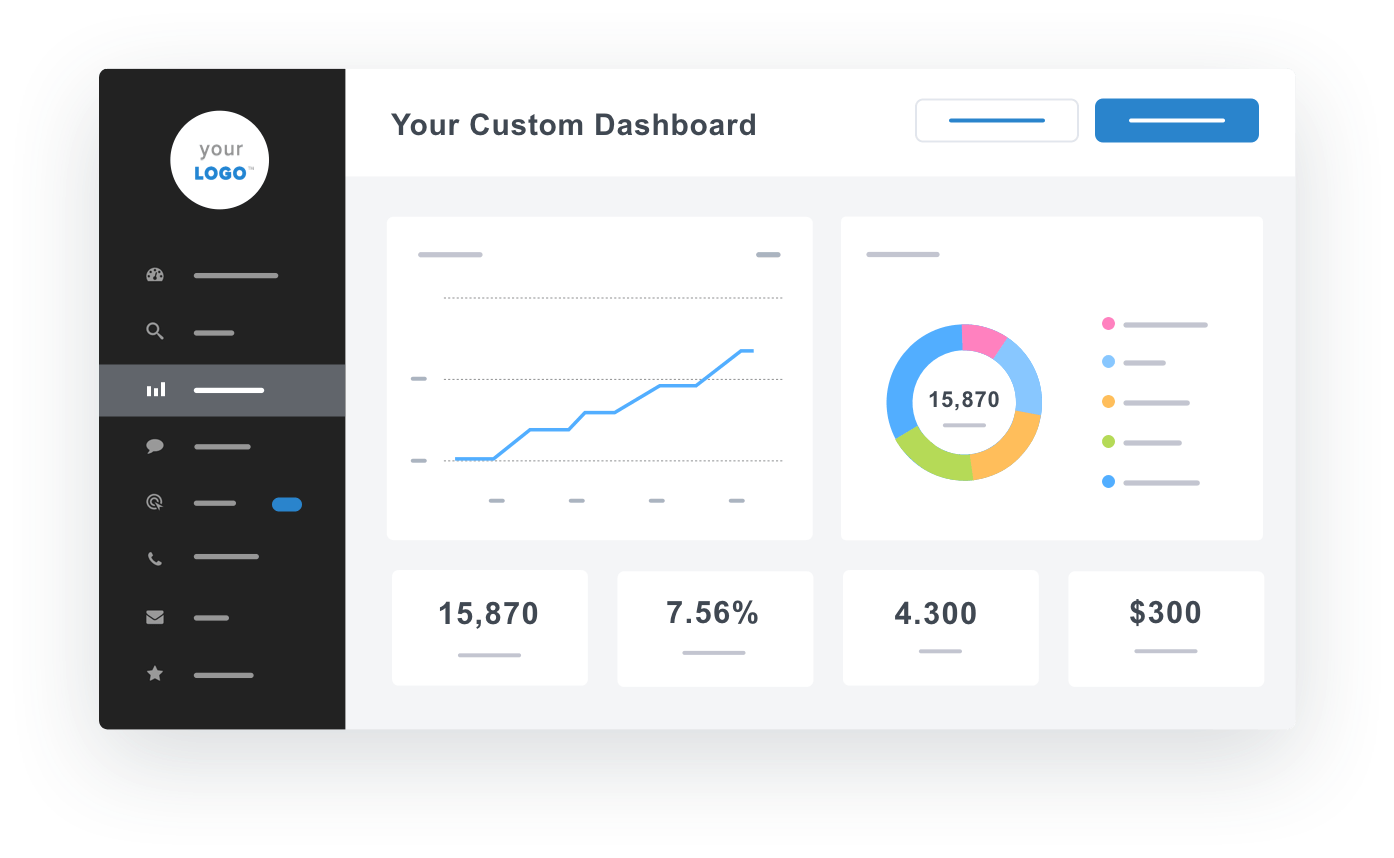
Constant Contact’s dashboard is cleanly organized with main functions easy to locate. The left sidebar menu links to key areas: create emails, view campaigns, access contacts, and view reports.
The activity feed shows recent system notifications. Some users may desire more customization options for dashboards based on role.
Overall, the UI has a moderate learning curve. New users can comfortably build basic email campaigns with an intuitive workflow. However, some advanced functions take more time to master.
Email Subscriber Migration
Importing contact lists from other services like mail servers or CSVs is straightforward. Users can schedule regular imports through IMAP/POP3 syncing. For most subscribers, batch uploads work smoothly.
However, extremely large databases of over 100k contacts may hit limitations unless perfectly formatted.
Overall, subscriber migration capabilities are reliable for small businesses graduating from basic email tools. However, highly advanced users may want increased customization around data flows.
2. Email Campaign Creation
Templates and Design
Constant Contact offers hundreds of professionally designed email templates to choose from. These cover common use cases like promotions, newsletters, and announcements. Templates are cleanly categorized based on intent making them easy to browse.
The templates are mobile-optimized and have color schemes and images built-in. However, there are limited options to customize certain elements like fonts without coding skills. There’s also a landing page builder and multiple templates for landing pages to choose from.
Overall, the templates and builder allow you to quickly build emails that look polished but more control is desired for highly customized, branded designs.
Personalization and Automation
Constant Contact personalizes email content using merge tags for first names, interests, and other attributes. Building basic segmented lists to target groups is straightforward. More advanced behavioral filtering options require a premium subscription.
Setting up automated workflows like welcome series or abandoned carts requires technical knowledge of drag-and-drop workflow builders. So personalization and automation capabilities serve basic small business needs, but advanced options require increased expertise.
3. Contact Management
Organizing Contacts

Constant Contact makes it easy to import and organize contact lists for segmented email targeting. Lists can contain detailed subscriber profiles with custom attributes like location, gender, and purchase history. Tagging contacts and designing groups for segmented messaging takes just a few clicks.
Contact-level preference management allows subscribers to update subscriptions themselves. Overall, core contact organization capabilities are simple enough for small business owners without technical expertise.
However, larger databases may benefit from more advanced grouping logic and custom fields for intricate segmentation strategies.
Cleaning up Email Lists
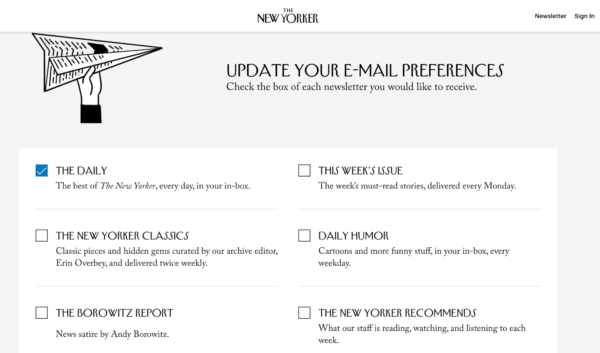
Keeping subscriber lists clean and updated is vital for email deliverability and compliance. Constant Contact helps identify inactive email addresses and removes bounce-backs automatically over time.
List hygiene features like merge duplication-checking are handy for maintaining quality data. For more advanced list cleansing based on complex rules and workflows, users may need to export subscriber segments and process the data externally.
Tight integrations with address verification services would strengthen internal list management capabilities.
Segmentation and Targeting
Constant Contact enables both basic and advanced email targeting. Intuitive controls make it easy to create new segments based on categories like demographics, interests, and purchase history.
More complex behavioral filters, as well as A/B testing options, require premium plans. The segmentation features integrate cleanly with the email campaign builders for personalized messaging at scale.
Overall, targeting capabilities are sufficiently customizable for most use cases. However, high-volume senders may benefit from more intricate grouping and messaging workflows.
4. Email Deliverability
Email deliverability refers to how reliably a platform can send emails that reach subscriber inboxes rather than getting flagged as spam. This vital capability heavily influences email marketing performance.
Based on aggregated data from email verification services, Constant Contact maintains average sender reputation scores compared to industry benchmarks. Sources like Validity.com rate Constant Contact in the 80th percentile for inbox placement rates.
The platform employs address list hygiene technology to remove risky or inactive email addresses. Constant Contact also enforces strict sending protocols aligning with CAN-SPAM and GDPR standards to encourage trust from major ISPs.
However, some users have reported deliverability challenges when sending high-volume campaigns, indicating potential infrastructure constraints. And advanced inbox testing capabilities may bolster confidence for customers sending very large subscriber blasts.
Overall, Constant Contact provides reliable deliverability for average small business email volumes with their automatic list cleaning and built-in compliance tools. However, high-volume enterprise marketers may desire more control around managing sending reputation and testing inbox placement at scale across different ISPs.
5. Analytics and Reporting
Performance Metrics
Constant Contact provides comprehensive email marketing analytics covering key performance indicators. Core metrics include open rates, click-through rates, bounce rates, engagement times, and social sharing activity.
These help quantify campaign effectiveness and subscriber engagement levels. Granular segmentation reporting reveals differences in response rates across contact lists and groups. The metrics provide a practical snapshot of email program health to inform future content planning.
However, customizing dashboard views takes some manual work rather than dynamic filtering.
Visual Reports and Insights
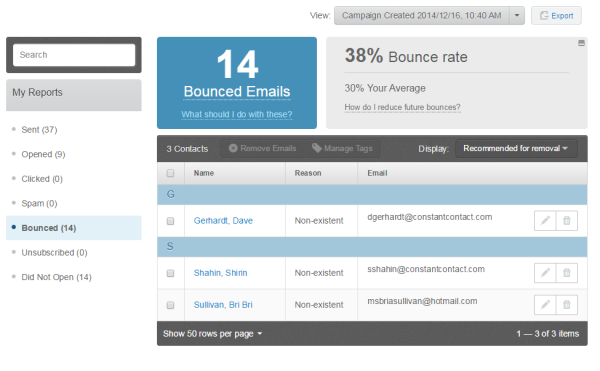
Displaying crucial email performance metrics, Constant Contact’s visual reports spotlight trends through charts and graphs.
Comparing campaign stats side-by-side is simple for gauging effectiveness. The reports conveniently integrate campaign activity data with contact list profiles for drilling down. For instance, knowing which subscriber segments have the highest open rates helps target higher-value groups.
While report customization options could improve, core templates provide the vital analytics most small business marketers need for optimizing campaigns.
6. Integrations
CRM Integrations
To connect marketing and sales workflows, Constant Contact integrates with popular CRM platforms like Salesforce and Zoho. Key capabilities include two-way contact data syncing to maintain updated subscriber lists, shared activity tracking for complete lead lifecycle insights, and triggered email actions from CRM system events.
The CRM integrations simplify cross-channel engagement coordination. But some use cases like syncing email metrics back to lead profiles may need extra configuration. For convenience, Constant Contact offers its own built-in CRM with expanded marketing tools for integrated visibility.
E-commerce Integrations
Constant Contact also offers e-commerce platform integration using plugins and APIs. This includes top solutions like Shopify, Wix, WooCommerce, and BigCommerce. Key features are real-time data syncing for abandoned browse/cart workflows and customer re-engagement.
Granular visibility on customer lifecycle and purchasing behaviors helps segment contacts and create targeted campaigns.
Inventory or order updates also trigger relevant emails to contacts. The integrations sufficiently cover the core needs of most online stores. However, more advanced use cases may desire greater customization of data flows between systems.
7. Compliance and Security Features
GDPR and Other Compliance Measures
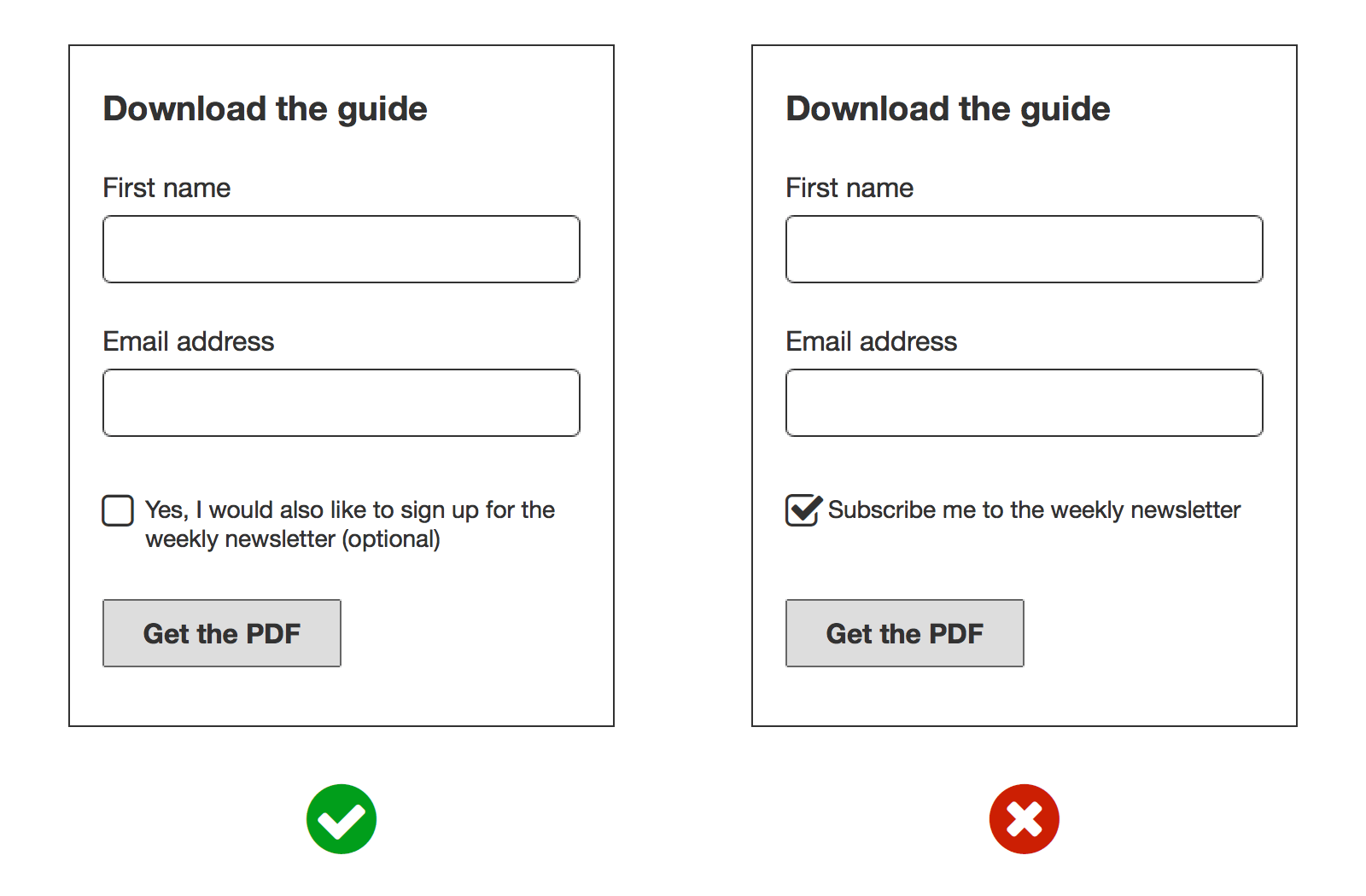
As an established email marketing platform, Constant Contact incorporates necessary safeguards around subscriber data regulations. customizable opt-in collection Forms and granular consent logic streamline GDPR and CAN-SPAM compliance.
Contact trace logs with detailed records of consent and communication history help demonstrate adherence if audited. Custom unsubscribe links in each email footer provide list management control to contacts.
While basic compliance capabilities are built-in, some advanced transactional use cases may warrant external legal review. Overall, Constant Contact sufficiently covers core regulatory requirements for most small business marketing needs.
Data Security and Privacy

All Constant Contact accounts enable SSL encryption for data transfer and storage. The platform also maintains comprehensive backup protocols with cloud-based redundancy to prevent data loss. Detailed subscriber permission settings give marketers control over data visibility based on purpose and sensitivity constraints.
However, some larger organizations may want to formally evaluate Constant Contact’s infrastructure against proprietary security frameworks before migrating sensitive information.
For average small business marketing contact data, existing safeguards are reasonably robust without requiring dedicated security engineering expertise.
8. Customer Support
Availability (Channels, Hours of Operation)
Constant Contact provides customer support through phone, email, and live chat support. Chat and phone support are available Monday-Friday from 8 am to 8 pm ET with additional Saturday hours. Email ticket response times average under 24 hours.
All paid plans include basic support access, while premium accounts get higher priority responses via phone/chat. Compared to competitors, phone coverage time is decent but not 24/7. Overall access meets general small business marketing needs.
Responsiveness and Effectiveness
According to external reviews, Constant Contact delivers satisfactory support experiences overall. While some users report inconsistencies with individual agents, most interactions resolve inquiries or issues reasonably well.
Average phone wait times run under 5 minutes for basic assistance. Chat and email responses vary from 2-24 hours depending on complexity and support tier. So for typical troubleshooting needs, responsiveness is adequate. More complex technical issues may require quicker or prioritized service.
Resources (Knowledge Base, Webinars, Tutorials)
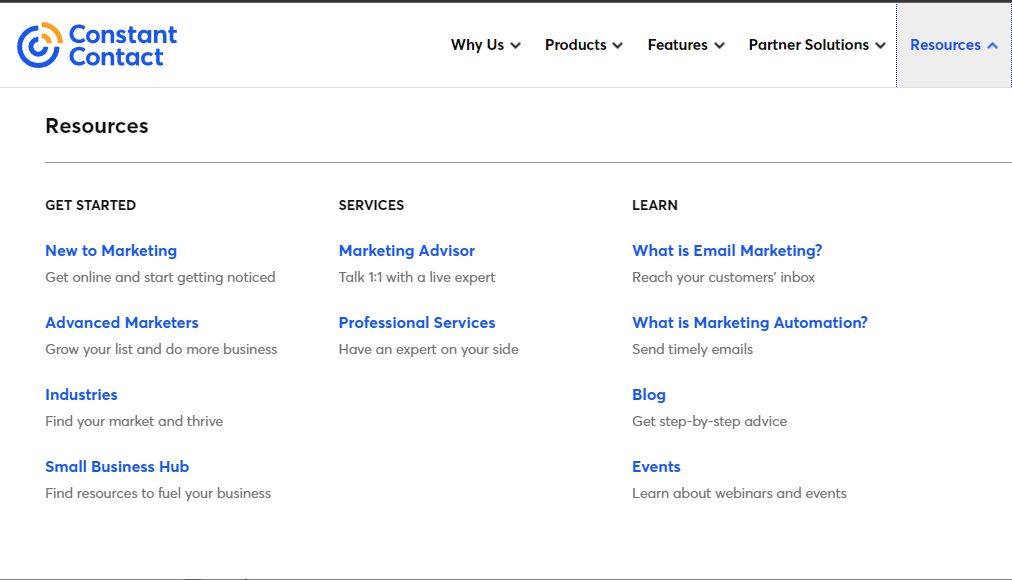
The Constant Contact help center has a searchable knowledge base with articles, videos, and guides covering core platform use cases.
Interactive getting-started resources and email marketing best practice content cater to small business education. However, the breadth and depth of advanced troubleshooting content lags competitors somewhat.
Webinars focus mostly on sales demos rather than tactical training for complex workflows. So for basic DIY onboarding, available resources suffice but heavier self-serve users may want expanded educational materials.
9. Constant Contact Pricing
Pricing Tiers

Constant Contact offers 3 core paid plans: Lite, Standard, and Premium. These range from $12 – $80/month with discounts for an annual Constant Contact subscription.
Higher tiers add more contacts, premium digital marketing tools like behavioral automation, and priority support to complement your digital marketing. There is also a free trial with basic functionality, but no long-term free tier beyond sign-up incentives.
Comparison with Competitors
Compared to rivals, it’s easy to see how Constant Contact comes out on top. The email marketing software strikes a reasonable balance of capabilities versus cost. The middle-tier plans compete well with email marketing-focused small businesses under 10k contacts.
However, SendinBlue and Mailchimp offer more robust free tiers with no contact number restrictions. Tools better suited for fast-scaling businesses offer lower CPM rates at higher tiers above 50k contacts.
Value for Money
Considering included contact allotments and functionality per dollar, Constant Contact’s lower-priced tiers offer solid value.
The free trial period also helps determine fit for the email marketing tool. Factoring essentials like deliverability, compliance, and reporting – paired with strong customer support and education – most emerging email marketers can extract substantial ROI from investments in Constant Contact’s software and services.
However, growing power users should reference pricing tiers against contact database forecasts to confirm longer-term cost-effectiveness.
10. Pros and Cons
Advantages of Using Constant Contact
Intuitive email builder and templates enable fast campaign creation. Contact management and segmentation capabilities are solid for targeted messaging. Deliverability rates to subscriber inboxes are reliable according to benchmarks.
Integrations with top CRM and e-commerce platforms simplify multi-channel coordination. This includes social media platforms for easy social media marketing. Educational resources and customer support provide ample training for small business owners. Starter plans offer strong value with discounted annual contracts.
Limitations and Challenges
Contact allotments in lower pricing tiers are relatively limited. Lacks robust automation for advanced behavioral targeting compared to rivals. Custom reporting functionality is missing for dynamic filtering insights. Support response times deteriorate for complex technical questions or issues.
Steeper learning curve around building workflows beyond basic email functionality. Mid-tier transition pricing is not the most cost-effective for scaling above several thousand contacts.
The platform excellently covers email campaign creation, compliance, education, and support for early email marketers.
However, growing power users need more advanced segmentation tools, custom reporting, and scalable pricing for added contacts. Quicker and prioritized customer service is also desired as programs mature.
11. Customer Testimonials
Customer Feedback and Rating
On leading software review site G2, Constant Contact earns high ratings across key criteria like ease of use, quality of support, and ease of doing business.
Their overall satisfaction score reaches 90% positive reviews from actual verified users. Areas highlighted include intuitive UI for email creation, attentive customer support representatives, and a transparent sales process.
However, some negative issues like steep pricing for mid-market needs did emerge as pain points reducing scores for specific groups.
Capterra feedback follows similar themes around problems with rigid pricing tiers as contacts outgrow limitations.
However, most agreed core email marketing functionality performs well for starter users. As evidence, Constant Contact averages an overall 4 out of 5-star rating based primarily on small business software buyer reviews.
Most users praise tools for fast campaign development, quality templates, images, and reliable analytics. However, needs beyond basic email touch on drawbacks around complex workflows or advanced automation capabilities where alternatives saw higher marks.
So for the target entry-level segment, Constant Contact continues earning praise for ease of adoption. However, niche power user feedback indicates scaling limitations beyond starter capabilities that competing solutions may address with expanded toolsets.
12. Alternatives
Brief Comparisons with Other Email Marketing Platforms
Top Constant Contact alternatives favored by switchers include Mailchimp, SendinBlue, and Omnisend based on price, features, or use-case fit.
Mailchimp edges ahead for free tiers accommodating larger contact lists and automation tools, also offering more scalable pricing. SendinBlue competes attractively for reliability and contact management. Omnisend specializes solely in e-commerce marketers with tighter store integrations.

Depending on customer size and needs, alternatives can match or exceed Constant Contact’s offering around deliverability guarantees, education content, and simplicity for getting started quickly.
However, competitors with wider toolsets also carry steeper learning curves that Constant Contact sidesteps to cater to beginners specifically.
Constant Contact’s unique selling proposition is providing an easy-to-start yet still comprehensive email marketing platform purposely designed for small business owners without technical expertise.
Compared to more complex or developer-focused rivals, Constant Contact eases onboarding speed to value by concentrating foundational UI, support, and education around fast campaign creation, reliable sending, integrated templates, and straightforward analytics of engagement essentials rather than heavy customization or intricate segmentation logic.
This makes Constant Contact ideal for early email marketers focused on practical growth versus maximizing advanced technical capabilities that require further specialization or development resources to harness quickly.
So Constant Contact squarely addresses the mainstream small business audience excellently as an email marketing entry point while also maintaining enough functionality depth for moderate customer lifecycle engagement needs before extending to systems tailored for enterprise-grade communication transaction volumes or intricate omnichannel coordination.
Their focused approach establishes Constant Contact as an Editors’ Choice provider according to Software Reviews Data Quadrant for email marketing software specifically targeting usability for marketers in the small business segment over more technical buyer personas from larger organizations.
If you’d like to learn how Constant Contact compares to other email marketing platforms by reading in-depth comparisons, check them out below:
- Constant Contact vs. Tinyemail
- Constant Contact vs. ConvertKit
- Constant Contact vs. HubSpot
- Constant Contact vs. Pardot
- Constant Contact vs. GetResponse
- Constant Contact vs. Mailerlite
- Constant Contact vs. ActiveCampaign
- Constant Contact vs. Klaviyo
- Constant Contact vs. Campaign Monitor
- Constant Contact vs. Sendgrid
- Constant Contact vs. Flodesk
- Constant Contact vs. Marketo
- Constant Contact vs. iContact
Final Thoughts
Constant Contact strikes an excellent balance of intuitive email marketing functionality with comprehensive educational resources to simplify getting started.
Their segmented pricing plans also make it affordable to leverage professional email capabilities for early customer engagement without breaking small business budgets. Where the platform excels includes campaign design, deliverability, compliance, and value provided through customer support versus purely self-serve learning.
Weaknesses primarily touch upon the lack of more advanced personalized workflows or intricate custom reporting as contact volumes grow beyond tens of thousands, and into higher tiers common among enterprises.
However, for the core small business audience Constant Contact squarely targets as their bread-and-butter, they deliver a polished product suiting the majority of email marketing foundation needs for entrepreneurs prioritizing campaign execution speed with less focus on technical customization.
Considering most strengths meet vital Email Marketing must-have features while most weaknesses remain contained to niche power user cases, Constant Contact lands perfectly as an accessible solution for non-technical emailers to expand beyond basic group messaging into more structured lifecycle nurturing and segmentation strategies.
Their brand positioning caters directly to guiding new email marketers through an education-first sales approach rather than overloading excess capability.
So emerging senders preparing first customer communications would gain immense value from Constant Contact capabilities fitting key engagement essentials supplemented with award-winning support representative assistance when encountering adoption obstacles that self-serve troubleshooting cannot address independently.
Therefore, Constant Contact works best for introducing professional email tactics to:
- Business owners without prior email marketing experience looking to upgrade from makeshift contact outreach
- Marketing generalists handling various responsibilities who need fast campaign creation in workflow
- Industry beginners prioritizing education and support over advanced customization needs
- Teams that value campaign fundamentals of appealing design paired with reliable analytics for insights into subscriber behaviors informing future content planning through easy-to-interpret reports and metrics tracking core engagement indicators
In summary, new email marketers starting their customer communications journey should strongly consider Constant Contact for their simplified approach. The platform lowers the email marketing barrier to entry through purpose-built automation and education catering directly to unique small business adoption requirements.
